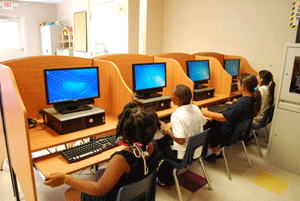 Video games have come a long way since your youth when your parents may have taken a dim view of your fascination with Donkey Kong or Space Invaders. For a long time parents seemed to draw a clear distinction between educational, or “good,” video games and entertaining, or “bad,” video games. Seeking to justify your fascination with virtually speeding around a racetrack or annihilating alien spacecraft for hours on end, your parents may have consoled themselves with the thought that at least you were building eye-hand coordination. But most of the time parents – and educators, psychologists and sociologists -- worried that video games were too sedentary, too anti-social, and too violent to be healthy for children.
Video games have come a long way since your youth when your parents may have taken a dim view of your fascination with Donkey Kong or Space Invaders. For a long time parents seemed to draw a clear distinction between educational, or “good,” video games and entertaining, or “bad,” video games. Seeking to justify your fascination with virtually speeding around a racetrack or annihilating alien spacecraft for hours on end, your parents may have consoled themselves with the thought that at least you were building eye-hand coordination. But most of the time parents – and educators, psychologists and sociologists -- worried that video games were too sedentary, too anti-social, and too violent to be healthy for children.
The first video game generation has now grown up and is confronting the video game issue with their children. Of course, video games have come a long way since the 1970-80s. While there are still plenty of car race and shoot-‘em-up games available, Wii and X-Box have added an interactive, physical dimension to gaming that addresses many of the sedentary and social complaints of the past. Leap Frog, Nickelodeon and Scholastic are using games to build academic skills. From preschool to high school, educators have embraced video games as a useful learning tool.
Gaming is still a frequent battleground between parents and children, but emerging scientific research may help alleviate parents’ concerns. New studies indicate that gaming enhances children’s reasoning capacity, improves spatial skills, and increases social interaction. Setting age-appropriate gaming limits and ensuring that your child lives a balanced life are still important, but video games may play an appropriate role in that balance.
Next time: The truth about video game myths





